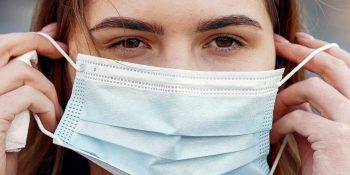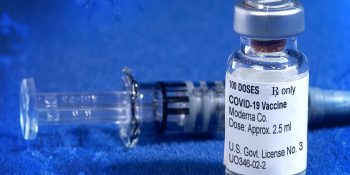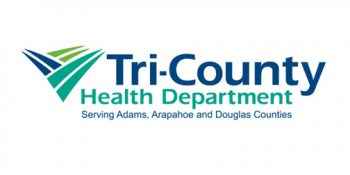The warming spring months bring thoughts of summer farmers’ markets – cultural, social and economic mainstays for consumers and food producers in Colorado and beyond.
With COVID-19 presenting new realities as the season begins, Colorado State University Extension and food systems experts are offering support to market managers and producers as they implement new ways of doing business. Safe and economically viable farmers’ markets, and adjacent business concerns for farmers, producers and artisans, are issues a busy task force at CSU is examining to help disseminate best practices and information.
“The governor has defined what is an essential or critical business for Colorado,” said Extension economist Becca Jablonski, assistant professor in agricultural and resource economics and lead facilitator of the CSU Task Force on Colorado Food Supply. “Farmers’ markets are included in that – which is great – but to keep them open, you can’t just do business as usual. It’s a very complex journey.”
To help navigate some of that complexity, CSU Extension agents with existing deep ties to the farmer and producer communities are working to lend a hand under trying, but in some ways, not unprecedented circumstances.
“As someone who worked through the Listeria outbreak in 2011, which had a really significant impact on farmers’ markets and the entire produce industry in Colorado as well as nationally, I think we’re getting better at responding to crises,” said Martha Sullins, an Extension specialist in agriculture and business management. The 2011 foodborne illness outbreak that spread across 28 states was linked to contaminated cantaloupes in Colorado.
Strict safety standards
Of course, SARS-CoV-2, which is not a foodborne pathogen, introduces a new set of challenges. But the produce industry in particular is used to managing various types of risks and adhering to strict food safety standards and protocols, and “is better prepared today to meet this challenge head-on,” Sullins said.
For the last several months, Sullins has been working with the Colorado Farmers’ Market Association, where she is president of the board, and its executive director, Rosalind May; the Colorado Department of Public Health and Environment; and local public health authorities statewide to craft uniform guidelines for farmers’ markets as they open for the season.
“Overall, my role is collecting and analyzing information and channeling it to the appropriate organizations and people who need it,” Sullins said. Those fall into broad categories like produce growers and meat producers, who are especially affected as large processing plants have been shut down due to illness within their workforce, causing a surge in demand at smaller-scale plants.
Expect different
Markets will be managed in a very different manner than people are used to, Sullins said, which may be especially challenging for markets in small and rural locations. Most markets, so often used as community gathering spaces with live music and picnic tables, will be limited to business transactions only. That could mean online ordering and curbside pickup, and strict social distancing measures to reduce crowding and control traffic flow. The guidelines include things like the use of dry-erase boards so customers can see prices from farther away and designating one person to handle payments and make change. No-touch transactions are preferred, with vendors encouraged to use digital payment methods.
Melanie Gonzales is manager of the Durango Farmers’ Market, set to open May 9, and one of many across the state readying for opening day under new COVID realities. In Durango, such changes include providing 6 feet of empty space between booths; required face coverings for vendors; ready-to-eat food in to-go containers only; and many others. The market is also limiting vendors to food or essential products only; excluded for now are service providers, artisans, sponsors and community groups. Gonzales and colleagues began setting up these new rules early on in the pandemic, understanding quickly that rules and regulations would need to be strictly enforced.
“We’re taking things step by step and day by day,” Gonzales said. “Sometimes it feels overwhelming, and sometimes it feels like, ‘OK, we can make this happen.’ First and foremost, we have to make the market a reasonable and safe place for our vendors to be able to vend.”
She had a message for consumers as well.
“Support your local growers and farmers. Come to the market. Don’t expect it to be a community event like before, but come get your produce.”
Food supply chains
A changing landscape for how farmers’ markets operate is only one piece of a complicated puzzle for food producers and growers, who sell not only at markets but also to restaurants, schools and distributors. Many of those supply chains aren’t operating or are moving at a reduced pace.
“One of our greatest concerns is the financial implications for some producers who don’t have the ability to change their business decision-making to respond to other market opportunities,” Sullins said. “An example is meat producers or growers for whom most of their business goes through restaurants or contracts with distributors. Direct sales are really where those new opportunities are and, if a producer has never sold directly to consumers before, it would be a very hard transition to make right now.”
These are issues that Extension agents, with the support of the Food Systems Task Force, are working to mitigate.
Adrian Card is an Extension specialist in Boulder County and a working board member of the Colorado Fruit and Vegetable Growers Association, where he is helping to provide COVID-19 resources for members. At the outset, he and colleagues saw an immediate need to help food suppliers quickly connect with new, potential buyers who could no longer sell through their normal channels.
Borrowing from a similar idea implemented in New England, Card helped organize and manage a “matchmaking” document with categories like food, labor, supplies, services and logistical transport to help different food sectors that might be struggling to make new connections. For example, if a producer suddenly needed cold storage this year, they could go to the document and find a potential new partner.
“We’re just at the beginning of this,” Card said. “CSU has done a remarkable job of moving rapidly to map the situation and help people find resources.”
Early on in the pandemic, Card also helped spearhead a statewide survey for members in partnership with Extension to identify immediate concerns and needs. Results were published April 8, with plans to conduct followups. Information from the surveys was quickly turned around to tailor webinars and other information sessions to help growers better understand how to protect their workforces and customers, from cleaning and sanitation practices to obtaining and using personal protective equipment. The Colorado Fruit and Vegetable Growers’ Association has also launched a webinar series related to managing stress and improving resiliency for farmers.
“The brilliance of this really close university and trade association relationship is a very tight feedback loop to be able to help producers as quickly as possible,” Card said.
CSU Task Force on Colorado Food Supply
Sullins and Card both serve on the CSU Task Force on Colorado Food Supply, established in response to the COVID-19 pandemic to serve the state with rapid-response research and outreach on a variety of food issues.
SPREAD THE NEWS
COMMENT, Like, Follow & SHARE @I70Scout









